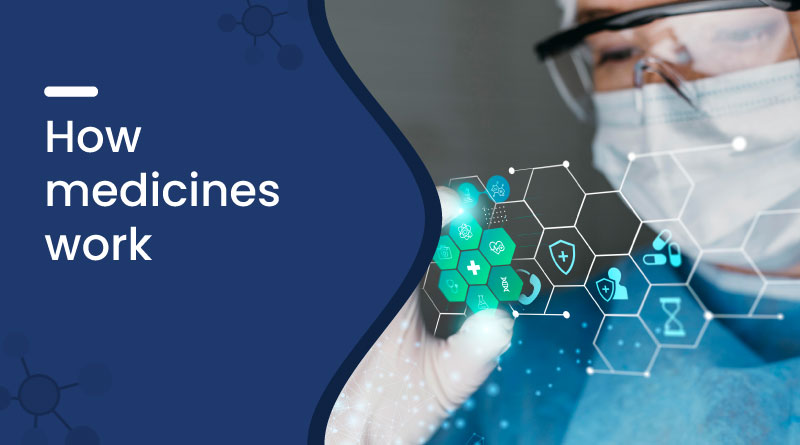How Medicines Work


Medicines are essential tools in modern healthcare, helping to treat, manage, and prevent a wide range of medical conditions. But have you ever wondered how medicines actually work within your body? Whether it’s a simple painkiller or a complex treatment for a chronic disease, medicines have specific mechanisms of action. In this blog post, we’ll explore how medicines work, why they’re important, and touch upon the differences between Generic Medicines vs. Branded Medicines. Understanding how medicines work can empower you to make informed choices for your health. If you have ever given it a thought, it is amazing how medicines work in our bodies. Why is it so that the medicine for headache goes into our stomach and heals the headache? Since our childhood and adolescence, we all have been using medicines for different health-related issues. At times when we are sick and go to the doctor for a health check-up, we are prescribed certain medicines which when consumed make us feel better in some time, whether it is for fever, cough, cold, or any other ailment. Have you ever pondered upon how medicines work in our bodies? Well, how medicines work is a mystery for at least for all those who have not studied medicines. In this article, you will get to know how medicines work to heal us from different ailments.
What Are Medicines?
Medicines are substances used to prevent, treat, or manage health conditions. They come in various forms, including tablets, capsules, injections, and creams. Medicines may be either branded or generic. Branded medicines are sold under a trademarked name, while generic medicines contain the same active ingredients and are typically much cheaper. Despite their price difference, both branded and generic medicines work in the same way to help treat medical conditions.
How Do Medicines Work in the Body?
Medicines work by interacting with the body in specific ways. Depending on the type of medicine, they may target a particular part of the body, such as the brain, heart, or immune system. Here are the general mechanisms through which medicines work:
Absorption
When you take a medicine, it enters your body through the digestive system or directly into the bloodstream if injected. The body absorbs the medicine, allowing the active ingredients to enter your bloodstream and travel to the area where they are needed. The rate and efficiency of absorption can vary depending on the form of the medicine and other factors like food intake or the presence of other medications.
Distribution
After medicines are absorption in the body, the next step in the process is distribution. After the body receives a medicine inside, it is carried in the body through the bloodstream. While this step is happening in the body, side effects can occur when a drug has an effect at a site other than its target site. For a pain reliever, the target organ might be a sore muscle in the arm; but the irritation of the stomach could be a side effect. Drugs destined for the central nervous system face a nearly impossible to cross barricade called the blood-brain barrier that protects the brain from potentially dangerous substances such as poisons or viruses. Other factors that can influence distribution include protein and fat molecules in the blood that can put drug molecules out of commission by latching on them.
Action at the Target Site
Medicines exert their effects by binding to specific proteins or receptors in the body. For example, painkillers like ibuprofen work by blocking the production of certain chemicals that cause pain and inflammation. On the other hand, antibiotics work by targeting bacteria, either killing them or preventing their growth. The medicine interacts with cells, tissues, or organs to produce the desired effect, whether that’s pain relief, infection control, or other therapeutic benefits.
Metabolism and Elimination
After the distribution of medicine, the process of breaking medicine or metabolism takes place. The medicine that enters the bloodstream whether swallowed, injected, inhaled, or absorbed through the skin goes into the liver where is it is twisted, pummelled, cut apart, and transformed by proteins called enzymes. Medicine that will effectively work then goes to its target site after breaking down.
How Do Generic Medicines Work?
Generic medicines work in exactly the same way as their branded counterparts. The key difference between Generic Medicines vs. Branded Medicines is that generics contain the same active ingredients in the same dosages but are typically less expensive. Generic medicines are subject to the same rigorous standards for safety, effectiveness, and quality as branded medicines. The major difference lies in their price, as generic manufacturers do not have the same costs related to research, development, and marketing that branded companies do.
Why Are Medicines Important for Health?
Medicines play a crucial role in maintaining health and managing medical conditions. Here’s why they’re important:
- Treatment of Diseases: Medicines help treat a variety of health conditions, from infections to chronic diseases like diabetes and hypertension.
- Prevention: Some medicines are used to prevent diseases, such as vaccines that protect against infections or statins that reduce the risk of heart disease.
- Symptom Management: Many medicines help manage symptoms, improving the quality of life for those with conditions like asthma, arthritis, or depression.
- Restoration of Health: Medicines help the body restore balance and promote healing, whether through reducing inflammation or boosting the immune system.
The Difference Between Generic and Branded Medicines
While both generic and branded medicines have the same effect, the most significant difference lies in the cost. Branded medicines are often sold at a premium price due to the costs involved in their development, research, and marketing. On the other hand, generic medicines are much cheaper because they don’t require the same level of investment in research and marketing. However, both types of medicines must meet the same regulatory standards for safety, efficacy, and quality, ensuring they provide the same therapeutic benefit.
Benefits of Using Generic Medicines
Choosing generic medicines over branded ones offers several benefits:
- Affordability: Generic medicines are typically 30% to 90% cheaper than branded medicines, making them more accessible for patients.
- Same Effectiveness: Since they contain the same active ingredients, generic medicines work just as well as branded medicines.
- Increased Access to Medicines: The cost savings make it easier for people, especially those in lower-income groups, to access essential medications.
- Encouraging a Healthy Economy: The widespread use of generic medicines helps reduce overall healthcare costs, freeing up resources for other healthcare needs.
How to Choose the Right Medicine
When choosing between generic and branded medicines, consider the following tips:
- Consult with a Doctor: Always discuss with your healthcare provider before switching to or starting a new medicine. Your doctor can help you decide which option is best for you.
- Consider the Price: If cost is a major concern, ask your doctor or pharmacist about the availability of generic alternatives that provide the same benefits at a lower price.
- Check for Certification: Whether it’s a branded or generic medicine, ensure it’s approved by the appropriate regulatory body, such as the FDA or CDSCO in India.
- Review the Medicine’s Side Effects: Always read the information provided with the medicine to understand potential side effects, and report any adverse reactions to your doctor.
Conclusion: Making Informed Choices About Medicines
Understanding how medicines work can help you make better decisions about your health and treatment options. Whether you opt for generic medicines or branded medicines, both serve the same purpose of treating and managing medical conditions. The most important thing is to work closely with your healthcare provider to ensure you are choosing the right medicine for your needs. With affordable options like generic medicines, you can access the treatment you need without breaking the bank. By making informed choices, you can improve your health and well-being in a cost-effective way.
Recent Blogs
Disclaimer : Zeelab Pharmacy provides health information for knowledge only. Do not self-medicate. Always consult a qualified doctor before starting, stopping, or changing any medicine or treatment.
















 Added!
Added!